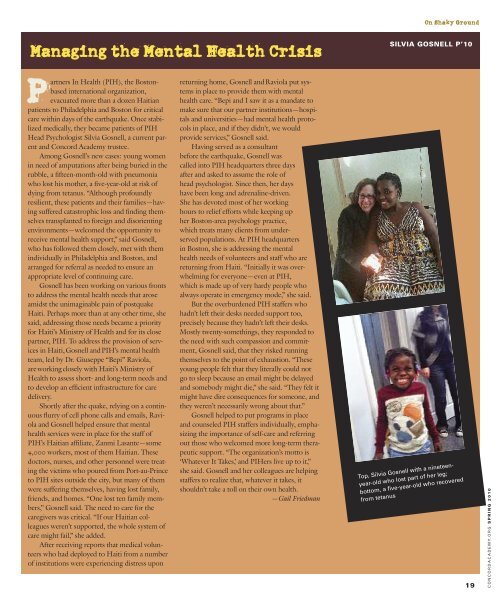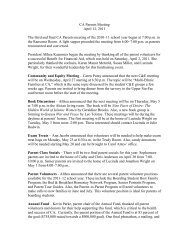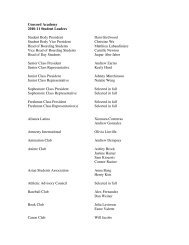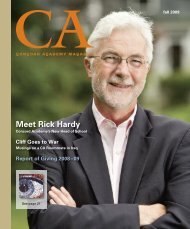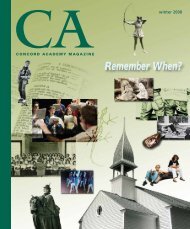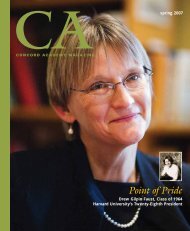Class Notes
S - Concord Academy
S - Concord Academy
- No tags were found...
Create successful ePaper yourself
Turn your PDF publications into a flip-book with our unique Google optimized e-Paper software.
On Shaky GroundManaging the Mental Health CrisisSILVIA GOSNELL P’10Partners In Health (PIH), the Bostonbasedinternational organization,evacuated more than a dozen Haitianpatients to Philadelphia and Boston for criticalcare within days of the earthquake. Once stabilizedmedically, they became patients of PIHHead Psychologist Silvia Gosnell, a current parentand Concord Academy trustee.Among Gosnell’s new cases: young womenin need of amputations after being buried in therubble, a fifteen-month-old with pneumoniawho lost his mother, a five-year-old at risk ofdying from tetanus. “Although profoundlyresilient, these patients and their families—havingsuffered catastrophic loss and finding themselvestransplanted to foreign and disorientingenvironments—welcomed the opportunity toreceive mental health support,” said Gosnell,who has followed them closely, met with themindividually in Philadelphia and Boston, andarranged for referral as needed to ensure anappropriate level of continuing care.Gosnell has been working on various frontsto address the mental health needs that aroseamidst the unimaginable pain of postquakeHaiti. Perhaps more than at any other time, shesaid, addressing those needs became a priorityfor Haiti’s Ministry of Health and for its closepartner, PIH. To address the provision of servicesin Haiti,Gosnell andPIH’s mental healthteam, led by Dr. Giuseppe “Bepi” Raviola,areworkingclosely with Haiti’s Ministry ofHealth to assess short- and long-term needs andto develop an efficient infrastructure for caredelivery.Shortly after the quake, relying on a continuousflurry of cell phone calls and emails, Raviolaand Gosnell helped ensure that mentalhealth services were in place for the staff ofPIH’s Haitian affiliate, Zanmi Lasante—some4,000 workers, most of them Haitian. Thesedoctors, nurses, and other personnel were treatingthe victims who poured from Port-au-Princeto PIH sites outside the city, but many of themwere suffering themselves, having lost family,friends, and homes. “One lost ten family members,”Gosnell said. The need to care for thecaregivers was critical. “If our Haitian colleaguesweren’t supported, the whole system ofcare might fail,” she added.After receiving reports that medical volunteerswho had deployed to Haiti from a numberof institutions were experiencing distress uponreturning home, Gosnell andRaviola put systemsin place to provide them with mentalhealth care. “Bepi and I saw it as a mandate tomake sure that our partner institutions—hospitalsand universities—had mental health protocolsin place, and if they didn’t, we wouldprovide services,” Gosnell said.Having served as a consultantbefore the earthquake, Gosnell wascalled into PIH headquarters three daysafter and asked to assume the role ofhead psychologist. Since then, her dayshave been long and adrenaline-driven.She has devoted most of her workinghours to relief efforts while keeping upher Boston-area psychology practice,which treats many clients from underservedpopulations. At PIH headquartersin Boston, she is addressing the mentalhealth needs of volunteers and staff who arereturning from Haiti. “Initially it was overwhelmingfor everyone—even at PIH,which is made up of very hardy people whoalways operate in emergency mode,” she said.But the overburdened PIH staffers whohadn’t left their desks needed support too,precisely because they hadn’t left their desks.Mostly twenty-somethings, they responded tothe need with such compassion and commitment,Gosnell said, that they risked runningthemselves to the point of exhaustion. “Theseyoung people felt that they literally could notgo to sleep because an email might be delayedand somebody might die,” she said. “They felt itmight have dire consequences for someone, andthey weren’t necessarily wrong about that.”Gosnell helped to put programs in placeand counseled PIH staffers individually, emphasizingthe importance of self-care and referringout those who welcomed more long-term therapeuticsupport. “The organization’s motto is‘Whatever It Takes,’ and PIHers live up to it,”she said. Gosnell and her colleagues are helpingstaffers to realize that, whatever it takes, itshouldn’t take a toll on their own health.—Gail FriedmanTop, Silvia Gosnell with a nineteenyear-oldwho lost part of her leg;bottom, a five-year-old who recoveredfrom tetanus19C O N C O R D A C A D E M Y. O R G S P R I N G 2 0 1 0


